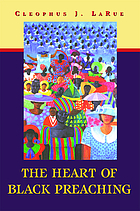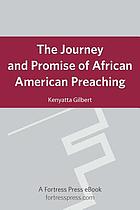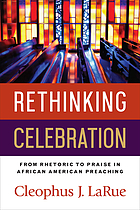
 The Heart of Black Preaching
by
Cleophus James LaRue
Cleophus LaRue argues that the extraordinary character of black preaching derives from a distinctive biblical hermeneutic that views God as involved in practical ways in the lives of African Americans. This hermeneutic, he believes, has remained constant since the days of slavery. LaRue analyzes the distinct characteristics of African American preaching and brings the insights of both theory and practice to bear on this important subject matter.
The Heart of Black Preaching
by
Cleophus James LaRue
Cleophus LaRue argues that the extraordinary character of black preaching derives from a distinctive biblical hermeneutic that views God as involved in practical ways in the lives of African Americans. This hermeneutic, he believes, has remained constant since the days of slavery. LaRue analyzes the distinct characteristics of African American preaching and brings the insights of both theory and practice to bear on this important subject matter.
 The Journey and Promise of African American Preaching
by
Kenyatta R. Gilbert
In many communities, both black megachurches and storefront congregations have been infected by a so-called prosperity gospel, far removed from the liberatory gospel that has been a mark of the black church since the earliest incarnation of the African Methodist Episcopal Church, and most celebrated in the preaching and oratory of the Rev. Dr. Martin Luther King Jr. This book examines all these strains of African American preaching and points to a theologically and socially responsible renewal of black churches and their pastoral, prophetic, and wisdom functions in their communities.
The Journey and Promise of African American Preaching
by
Kenyatta R. Gilbert
In many communities, both black megachurches and storefront congregations have been infected by a so-called prosperity gospel, far removed from the liberatory gospel that has been a mark of the black church since the earliest incarnation of the African Methodist Episcopal Church, and most celebrated in the preaching and oratory of the Rev. Dr. Martin Luther King Jr. This book examines all these strains of African American preaching and points to a theologically and socially responsible renewal of black churches and their pastoral, prophetic, and wisdom functions in their communities.
 Rethinking celebration : From Rhetoric to Praise in African American Preaching
by
by Cleophus James LaRue 1953- (Author)
"This book is a clarion call for African American preachers to think more deeply about the aims and ends of their preaching—namely to stop putting so much emphasis on celebratory endings to our sermons and focus more on the substantive content in our sermons. Our so-called celebratory preaching, designed to excite the congregation into action through a highly emotional closing of the sermon, has had the opposite effect. Rather than inducing action, it has lulled generations of black congregants to sleep. While we are jumping up and down, shouting, and waving our hands in the air every Sunday during the worship hour, we seem not to notice the growing number of churched and unchurched alike who are becoming powerfully alienated from any form of institutional religion."
—from the introduction
"Celebration" is a term that has long been used to describe African American preaching, characterized by content that affirms the goodness and powerful intervention of God as well as style that builds from quiet beginnings to an emotionally rich crescendo in conclusion. Cleophus J. LaRue argues that while celebration is one of African American preaching's greatest gifts to the larger church, too many black preachers have become content with the form of celebration—volume, vocabulary, pitch, speed, rhythm, and the like—to the neglect of its essence—the proclamation of the mighty acts of God in the lives of their congregations and communities. This kind of preaching, LaRue contends, fails to address the ongoing problems of the African American community and is powerless to prevent the growing disaffection of black America with the black church. In words both prophetic and practical, LaRue suggests ways to improve black preaching that honor both the form and the power of the African American homiletical practice of celebration. Preachers will learn how to use celebration more selectively and as part of a fully formed preaching practice rather than as a means of distracting the congregation from pressing social and theological questions. The book includes six illustrative sermons from LaRue as well as Paschal Sampson Wilkinson Sr., Brian K. Blount, and Claudette Anderson Copeland.
Rethinking celebration : From Rhetoric to Praise in African American Preaching
by
by Cleophus James LaRue 1953- (Author)
"This book is a clarion call for African American preachers to think more deeply about the aims and ends of their preaching—namely to stop putting so much emphasis on celebratory endings to our sermons and focus more on the substantive content in our sermons. Our so-called celebratory preaching, designed to excite the congregation into action through a highly emotional closing of the sermon, has had the opposite effect. Rather than inducing action, it has lulled generations of black congregants to sleep. While we are jumping up and down, shouting, and waving our hands in the air every Sunday during the worship hour, we seem not to notice the growing number of churched and unchurched alike who are becoming powerfully alienated from any form of institutional religion."
—from the introduction
"Celebration" is a term that has long been used to describe African American preaching, characterized by content that affirms the goodness and powerful intervention of God as well as style that builds from quiet beginnings to an emotionally rich crescendo in conclusion. Cleophus J. LaRue argues that while celebration is one of African American preaching's greatest gifts to the larger church, too many black preachers have become content with the form of celebration—volume, vocabulary, pitch, speed, rhythm, and the like—to the neglect of its essence—the proclamation of the mighty acts of God in the lives of their congregations and communities. This kind of preaching, LaRue contends, fails to address the ongoing problems of the African American community and is powerless to prevent the growing disaffection of black America with the black church. In words both prophetic and practical, LaRue suggests ways to improve black preaching that honor both the form and the power of the African American homiletical practice of celebration. Preachers will learn how to use celebration more selectively and as part of a fully formed preaching practice rather than as a means of distracting the congregation from pressing social and theological questions. The book includes six illustrative sermons from LaRue as well as Paschal Sampson Wilkinson Sr., Brian K. Blount, and Claudette Anderson Copeland.
 The Sermon and the African American Literary Imagination
by
Dolan Hubbard
Characterized by oral expression and ritual performance, the black church has been a dynamic force in African American culture. In The Sermon and the African American Literary Imagination, Dolan Hubbard explores the profound influence of the sermon upon both the themes and the styles of African American literature. Beginning with an exploration of the historic role of the preacher in African American culture and fiction, Hubbard examines the church as a forum for organizing black social reality. Like political speeches, jazz, and blues, the sermon is an aesthetic construct, interrelated with other aspects of African American cultural expression. Arguing that the African American sermonic tradition is grounded in a self-consciously collective vision, Hubbard applies this vision to the themes and patterns of black American literature. With nuanced readings of the work of Frederick Douglass, Frances Ellen Watkins Harper, James Weldon Johnson, Zora Neale Hurston, Ralph Ellison, James Baldwin, and Toni Morrison, Hubbard reveals how the African American sermonic tradition has influenced black American prose fiction. He shows how African American writers have employed the forms of the black preaching style, with all their expressive power, and he explores such recurring themes as the quest for freedom and literacy, the search for identity and community, the lure of upward mobility, the fictionalizing of history, and the use of romance to transform an oppressive history into a vision of mythic transcendence. The Sermon and the African American Literary Imagination is a major addition to the fields of African American literary and religious studies.
The Sermon and the African American Literary Imagination
by
Dolan Hubbard
Characterized by oral expression and ritual performance, the black church has been a dynamic force in African American culture. In The Sermon and the African American Literary Imagination, Dolan Hubbard explores the profound influence of the sermon upon both the themes and the styles of African American literature. Beginning with an exploration of the historic role of the preacher in African American culture and fiction, Hubbard examines the church as a forum for organizing black social reality. Like political speeches, jazz, and blues, the sermon is an aesthetic construct, interrelated with other aspects of African American cultural expression. Arguing that the African American sermonic tradition is grounded in a self-consciously collective vision, Hubbard applies this vision to the themes and patterns of black American literature. With nuanced readings of the work of Frederick Douglass, Frances Ellen Watkins Harper, James Weldon Johnson, Zora Neale Hurston, Ralph Ellison, James Baldwin, and Toni Morrison, Hubbard reveals how the African American sermonic tradition has influenced black American prose fiction. He shows how African American writers have employed the forms of the black preaching style, with all their expressive power, and he explores such recurring themes as the quest for freedom and literacy, the search for identity and community, the lure of upward mobility, the fictionalizing of history, and the use of romance to transform an oppressive history into a vision of mythic transcendence. The Sermon and the African American Literary Imagination is a major addition to the fields of African American literary and religious studies.